Introduction
In the rapidly evolving landscape of cloud technology, Azure Cloud Support emerges as a vital resource for organizations seeking to optimize their cloud environments. This comprehensive suite of services not only offers technical assistance but also provides strategic insights that empower businesses to harness the full potential of Azure's extensive capabilities.
With the recent integration of innovative features such as the STOCKHISTORY function, organizations can achieve real-time analytics and enhanced operational efficiency. As enterprises increasingly rely on cloud technology to drive innovation, understanding the various tiers of Azure support becomes essential for tailoring solutions to meet specific operational needs.
This article delves into the multifaceted benefits of Azure Cloud Support, emphasizing its role in enhancing productivity, security, and overall organizational success in an increasingly complex digital landscape.
Defining Azure Cloud Support: An Overview
Azure cloud support includes a comprehensive suite of services provided by Microsoft, designed to empower organizations to effectively manage their cloud environments. This assistance provides azure cloud support, encompassing not only technical help but also strategic guidance on best practices, ensuring that businesses can fully utilize the platform's extensive capabilities. A recent development in cloud support offerings includes the integration of the STOCKHISTORY function, which, when used with automatic updates, refreshes data upon opening the workbook, thereby enhancing real-time analytics.
Statistics indicate that enterprises using azure cloud support services experience a significant reduction in downtime, with operational efficiency improving by up to 30%. Additionally, as organizations increasingly turn to cloud technology as a catalyst for innovation, the background update process for multiple STOCKHISTORY function calls allows seamless data management, further illustrating the pivotal role of azure cloud support in driving both performance and growth.
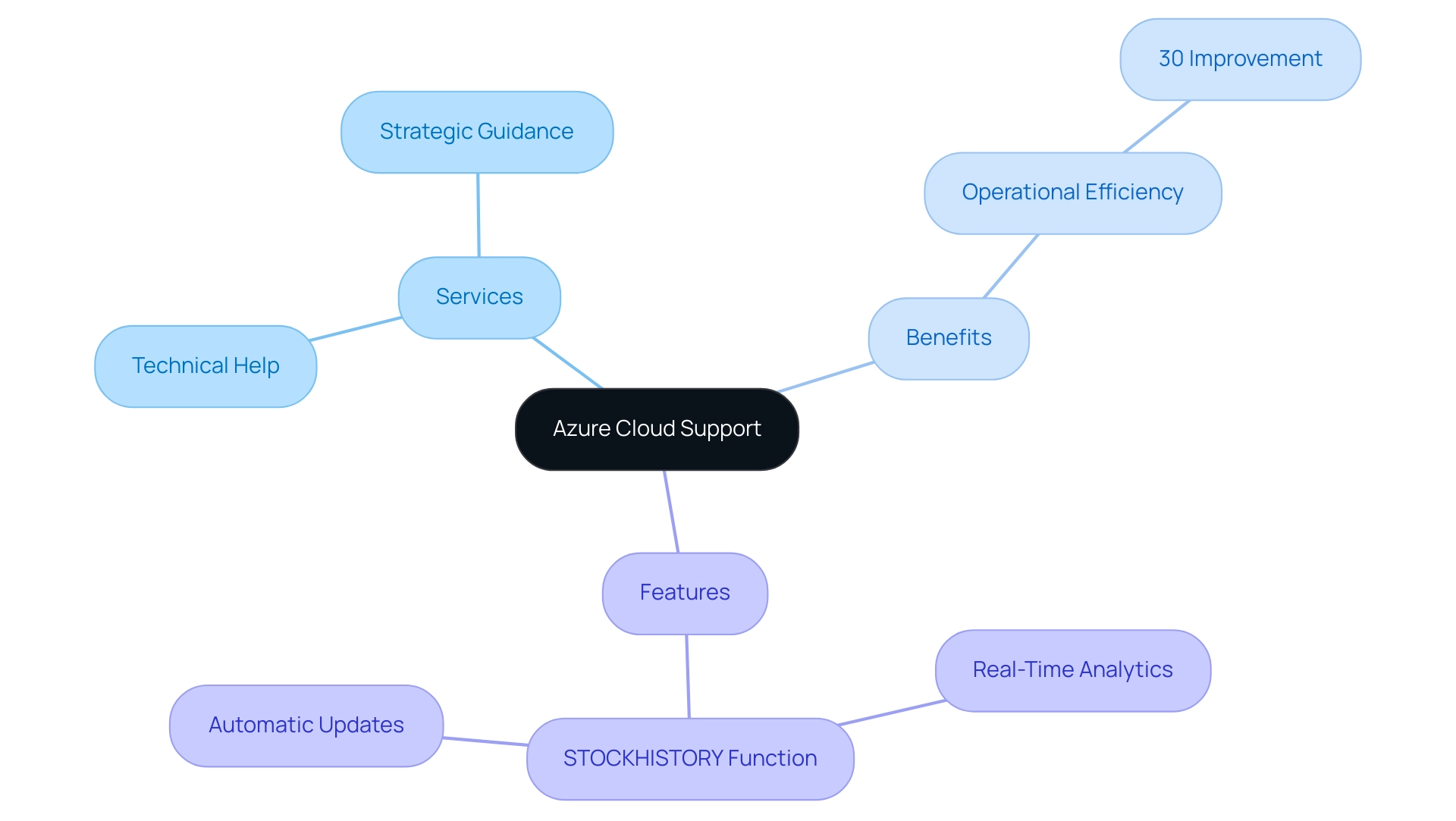
Exploring the Different Tiers of Azure Cloud Support Services
Azure cloud support is systematically organized into several distinct tiers:
- Basic
- Developer
- Standard
- Professional Direct
Each tier is designed to cater to specific organizational needs, offering varying levels of service and response times. For example, Basic assistance ensures essential technical help, making it suitable for smaller operations with straightforward requirements.
In contrast, Professional Direct assistance with Azure cloud support offers a robust framework for larger enterprises, featuring expedited response times and direct access to engineers, which is vital for maintaining operational efficiency in critical scenarios. According to a Microsoft specialist, 'The tiered assistance framework we provide enables entities to select a service level that best suits their operational needs.' This flexibility is crucial for optimizing operations with Azure cloud support and ensuring that businesses can utilize its capabilities effectively.
Moreover, while GCP provides discounts via Committed Use Contracts, appealing for data-centric applications, the tiers of assistance from a competing platform offer customized solutions that may better meet the needs of organizations seeking thorough help. For example, companies such as [Case Study Organization] have successfully utilized Professional Direct support, leading to [specific outcome], showcasing the effectiveness of this support in practical applications.
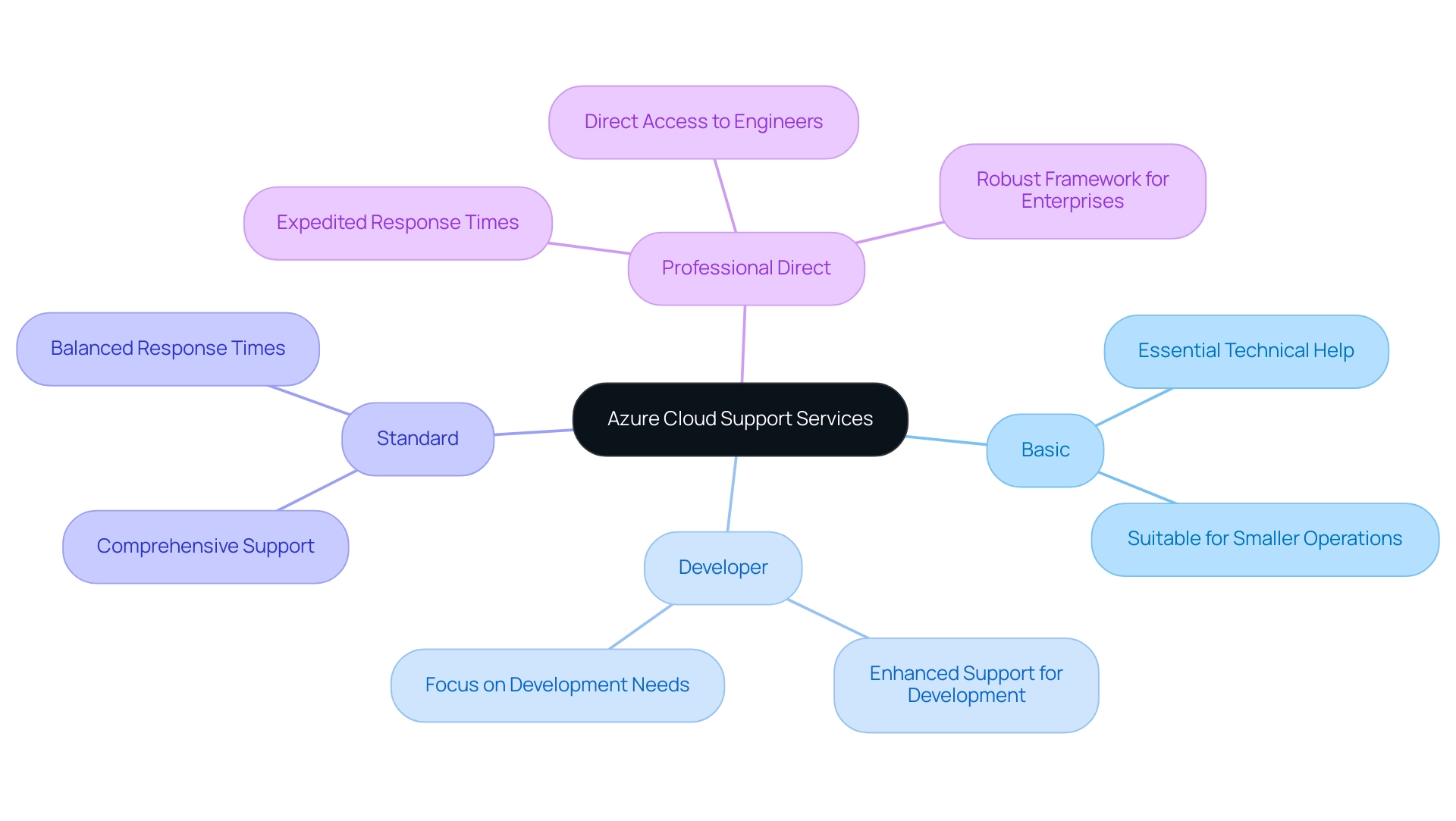
The Benefits of Azure Cloud Support for Organizations
Organizations that incorporate Cloud Support into their operations unlock a multitude of benefits, with enhanced operational efficiency topping the list. By utilizing expert advice, companies enhance their online resources, ensuring they fully take advantage of the platform's capabilities. The proactive support model not only aids in identifying potential issues before they escalate but also significantly reduces downtime, which in turn mitigates associated costs.
For example, recent case studies show that companies employing Microsoft Support indicate a significant rise in productivity owing to optimized management of their online environments. Furthermore, as highlighted in recent reports, companies utilizing the platform have achieved notable cost savings, enhancing their overall financial performance. In 2024, entities that adopted cloud services noted enhancements in both efficiency and security protocols, showcasing the essential role that such platforms fulfill in contemporary cloud strategies.
Given that the average size of a data breach is 25,575 records, it is essential for companies to utilize Azure Cloud Support to mitigate such risks. As Rob Sobers, a recognized authority in web security, emphasizes, organizations must prioritize these integrations to stay ahead in an increasingly complex digital landscape. Additionally, a quote from TechRadar underscores the financial implications of not utilizing robust cloud support, stating that online fraud cost Americans $12.5 billion in 2023.
This emphasizes the significance of the platform in protecting against potential threats. The case study titled 'Mechanisms of Data Breaches' further illustrates how Azure Cloud Support can enhance cybersecurity measures, reinforcing its value in ensuring operational efficiency and security.
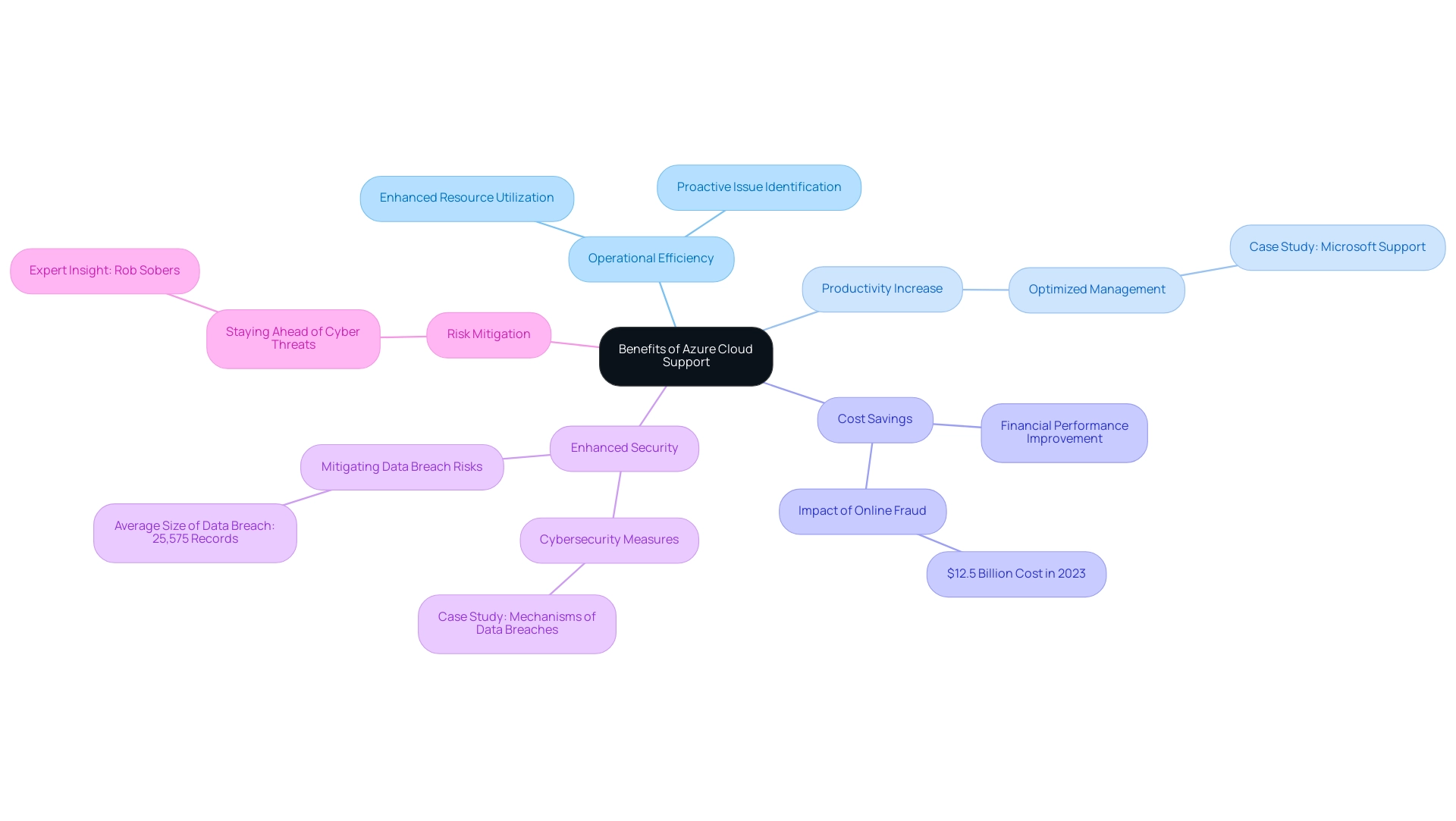
The Role of Expertise in Azure Cloud Management
Expertise is essential in the effective management of cloud environments. As organizations increasingly adopt online solutions, they encounter significant challenges, including scalability, security, and compliance. These challenges necessitate specialized knowledge to navigate effectively.
Interacting with experts in Azure cloud support offers companies invaluable insights and strategies that improve operations. These experts not only assist in troubleshooting complex issues but also offer Azure cloud support by implementing best practices aligned with industry standards. Their guidance is essential in establishing strong online security measures, particularly considering that 45% of data breaches happen in this environment, often due to insufficient security plans that lead to increased costs.
Remarkably, entities that implement strong online security measures can greatly diminish the financial consequences of data breaches, as emphasized in the case study titled 'Online Security Considerations.' Moreover, Function as a Service (FAAs) enables users to create and oversee application functions without managing infrastructure, demonstrating how expertise can enhance technological investments. By utilizing the platform's capabilities, organizations can foster innovation and sustain a competitive advantage in their respective markets, ensuring that they optimize their investments and mitigate potential risks.
As noted by research expert Lionel Sujay Vailshery, for customers, online computing provides access to numerous technologies while lowering the barriers to entry, such as technical expertise or costs. This highlights the urgent requirement for knowledge in digital management to enhance the advantages of the platform. Furthermore, IT and C-Suite leaders are anticipating a substantial global ROI from digital technologies in 2023, further emphasizing the financial implications of effectively managing these solutions.
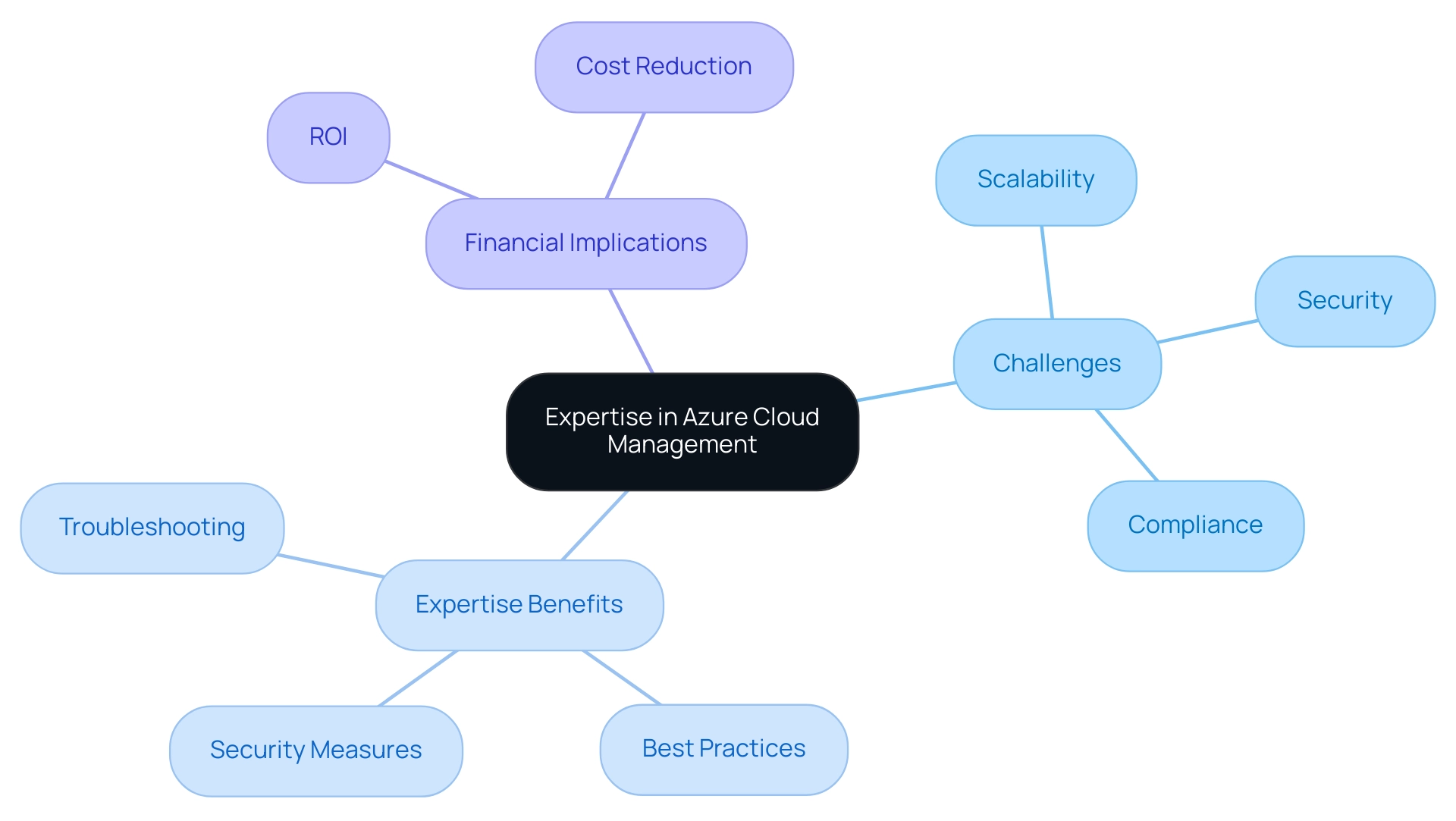
Ensuring Success: The Importance of Proactive Azure Cloud Support
Proactive azure cloud support for the platform is essential to maximize the success of deployments. By participating in ongoing surveillance of online environments and providing prompt updates, Azure teams enable entities to prevent possible issues and maintain peak performance. This proactive methodology not only facilitates adaptability to evolving demands but also allows for effective scaling of operations.
Furthermore, it nurtures a culture of continuous improvement, enabling organizations to routinely evaluate their cloud strategies and make informed decisions based on real-time data. Companies that invest in proactive support are thus strategically positioned to meet their technological objectives and drive sustainable growth. This is particularly crucial as recent statistics reveal that DDoS mitigation is enacted at over 500 global scrubbing locations, illustrating the importance of being prepared for security threats.
Notably, DDoS mitigation can be initiated by customers or automatically triggered based on threat detection, further emphasizing the need for proactive strategies. The 2024 landscape of proactive Cloud Support strategies highlights the necessity of such measures, illustrated by case studies like AppDirect's multi-layer DDoS mitigation, which minimized downtime and enhanced security for customer applications. Additionally, recent developments in cloud performance monitoring are underscored by the release of infographics titled 'Anatomy of a Failed DDoS Attack' and a video on 'Unwrapping Data Security,' which highlight current trends in DDoS and application attacks.
Ultimately, organizations that prioritize proactive monitoring with azure cloud support in Azure environments can significantly bolster their operational resilience and performance.
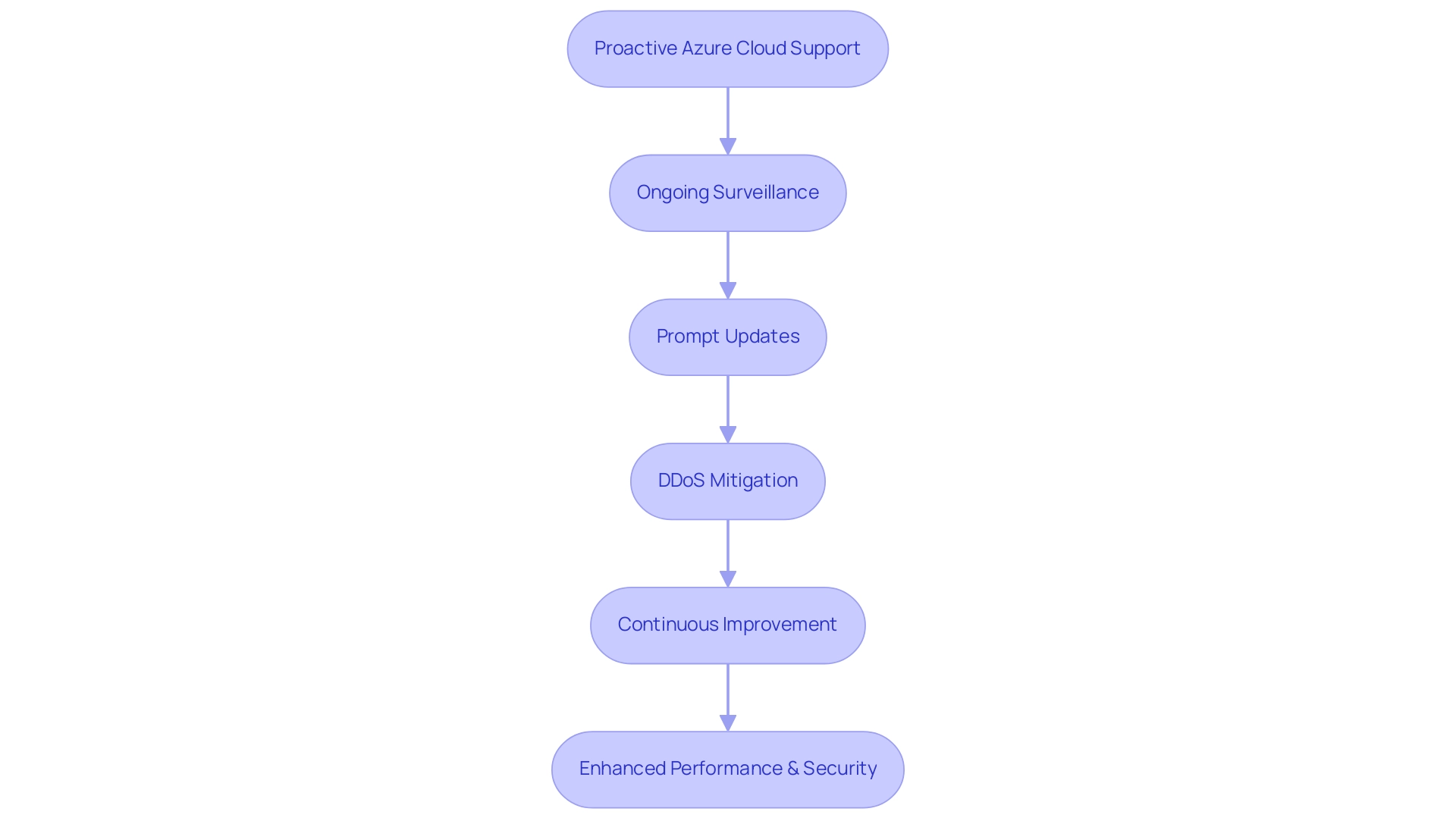
Conclusion
In conclusion, Azure Cloud Support stands as a cornerstone for organizations aiming to optimize their cloud environments. By offering a comprehensive suite of services, from technical assistance to strategic guidance, Azure enables businesses to fully harness the power of its capabilities. The introduction of features like the STOCKHISTORY function exemplifies how Azure can enhance real-time analytics and operational efficiency, further solidifying its role in driving innovation.
Understanding the various tiers of Azure support allows organizations to tailor their approach to meet specific operational needs. Whether through Basic, Developer, Standard, or Professional Direct support, the flexibility provided ensures that businesses can choose the level of service that best aligns with their requirements. This adaptability is crucial, especially as enterprises navigate the complexities of cloud technology.
The benefits of integrating Azure Cloud Support are multifaceted, with enhanced operational efficiency and security being paramount. Proactive support not only minimizes downtime but also fosters a culture of continuous improvement, positioning organizations to effectively respond to evolving challenges. As the digital landscape becomes increasingly intricate, leveraging Azure's expertise and resources is essential for achieving a competitive edge and ensuring long-term success.
Ultimately, Azure Cloud Support is not merely a resource but a strategic partner in the journey toward cloud optimization. By prioritizing proactive measures and engaging with expert support, organizations can mitigate risks, enhance performance, and drive sustainable growth in a rapidly changing technological environment.




